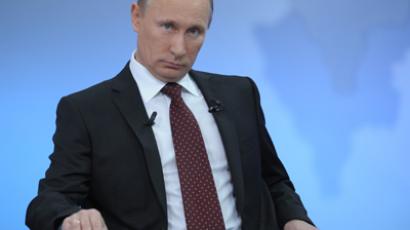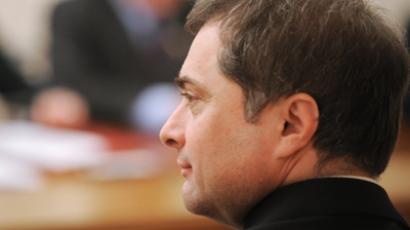Medvedev calls for major reform of Russia’s political system
President Dmitry Medvedev has said it is time for a comprehensive reform of Russia’s political system, which would give citizens an opportunity to be more involved in the political life of the country.
Making his final address to the Federal Assembly as president, Medvedev outlined the key components necessary for achieving political reform. “We should give all active citizens a legal right to participate in the political life,” he stressed. First, Medvedev said it is necessary to return to direct voting in electing heads of regions. Second, simpler rules for the registration of political parties should be introduced. The president went on to suggest that political parties could be officially registered on the basis of a petition of at least 500 people, which represent at least 50 per cent of the Russian regions. Medvedev also proposed to set aside the rule that requires parliamentary candidates to collect signatures for their candidacy in order to be allowed to participate in the State Duma vote or elections to regional legislative councils. Presidential candidates, meanwhile, would be required to collect less signatures to run in elections.Currently, independent candidates are required to submit two million signatures from across Russia. Medvedev said that number could be reduced to 300,000; as far as candidates nominated by parties that are not represented in the parliament, the number, he believes, could be reduced to 100,000.Medvedev then commented on the elections to the lower house, the State Duma, which he said should be changed to allow proportional representation for the millions of citizens across the country. “I think that introducing proportional representation for 225 districts would be reasonable in order to strengthen ties between the deputies and voters,” Medvedev said to applause. “This measure will allow each territory to have its own direct representative in parliament.” Presently, some regions have no representatives at all, he added.Finally, the head of state suggested changing the procedure of forming the Central Election Commission as well as regional commissions. “The representation of political parties in elections commissions should be broadened,” he said. “Parties should be given a right to recall their representatives from the commissions ahead of schedule, should such a necessity arise.”Medvedev noted that the announced list of reforms is not final. “I’d like to say that I hear those who speak about the necessity of changes and I understand them,” the president pointed out.
‘We won’t allow external interference’
In accordance with the Constitution, the President's message to the Federal Assembly is not only his right, but an obligation. Opening his speech, the president congratulated all newly-elected deputies of the State Duma, which had their first session of the sixth convocation the previous day. Medvedev wished them good luck and expressed his openness for dialogue on any issue.The Russian leader then mentioned the December 4 parliamentary elections, calling to mind the wide range of statements – both at home and abroad – following the poll. Medvedev said that while many people expressed their satisfaction with the results of the election process, others did not share this opinion – and that was absolutely normal. President Medvedev said the government paid attention to fair criticism, and would draw the appropriate conclusions and restore justice. Furthermore, it is the right of citizens to voice their opinions via legal avenues that were guaranteed by law. He noted that it is “a good sign” that the society is changing and people express their views more, actively setting legitimate demands on the authorities. “It is a sign that our democracy is growing more mature,” he observed. “In my opinion, it is a good tendency, which will benefit our country as growing political competition, which prompts us to improve the quality of our work and respond to problems of millions of Russian families more rapidly".However, any attempts to manipulate people and stir up social discord were unacceptable. “We will not let provocateurs and extremists draw society into their adventures, and will not allow any external interference into our internal affairs,” he stressed.The president underlined that Russia needs democracy, not chaos.
Summing up the four-year term
The president began his speech by reviewing the results of his four years in office. “We have successfully overcome the most difficult period of economic turmoil and have returned to pre-crisis level,” Medvedev said. “Russia has become the sixth largest economy in the world,” he added.Among other positive results, Dmitry Medvedev highlighted the lowest inflation rate in the country’s history in 2011, as well as the lowest unemployment rate in the world. He praised the effectiveness of the current demographic policy. Over the past four years, more than 6 million children have been born, which is a record for Russia in the last 20 years.Turning to the key issue of modernization, he specifically pointed to the development of civil society.“Our civil society has strengthened and has become more influential,” Medvedev said. “The social activity of non-government organizations has increased, and the events of the past weeks have confirmed this. I am convinced that this is one of the key achievements of recent years.” On technical and scientific development, Dmitry Medvedev cited the success of the newly created Skolkovo technology hub, which has already attracted more than 300 international companies. “I’m sure that Skolkovo will become the first example of the successful global scientific project. The first but not the last,” he stressed. In foreign policy, the president emphasized the significance of the signing of the new START treaty aimed at the reduction of strategic offensive weapons and nuclear warheads.“The treaty contributes to strategic stability. In addition, it has laid the foundations of new equal and indivisible security architecture,” the president stated. Another major result is the creation of the Customs Union of Belarus, Kazakhstan and Russia.
Russian Armed Forces: looking for a few good professionals
Professional contract officers and soldiers are gradually replacing draftees in the Russian armed forces as President Dmitry Medvedev continues with his far-reaching reform plans.The Russian Armed Forces will increase the number of officers, soldiers and sergeants recruited by contract, Medvedev said in his address to the Federal Assembly inside the gilded Georgievsky Hall of the Moscow Kremlin on Thursday. "In spite of the crisis, we have taken steps towards making our Armed Forces more compact, mobile and capable of combat.”Part of this transition requires that the Russian Armed Forces move from a conscription-based army to one that relies on professional troops who join on a contractual basis."A switch to the professional Armed Forces has begun,” the Russian leader said. “Already next year we will have 220,000 officers and more than 180,000 soldiers and sergeants recruited by contract." The total number of personnel in the Armed Forces' stood at one million in 2010, he noted.Medvedev also mentioned the creation of a new high-tech arm of the military, known as the Aerospace Forces.The Russian leader then alluded to what sort of armaments this professional army will carry into some hypothetical battle scenario."The state armament program until 2020 puts the emphasis on new types of weaponry and military hardware based on high technologies,” he said, before mentioning Russia’s defense industries, which are improving the quality of their armaments with each new order.“A large part of defense orders are placed several years in advance, which seriously improves the development of defense plants,” he noted. “In turn, defense contractors must fulfill the contracts with due quality and on time.”The Russian leader concluded by addressing an issue that is of concern for military officers, which was the lack of hands-on training with new armaments and weapons. Today, Russia is giving its recruits the necessary combat training to utilize the new weapon technology."The intensity of operative and combat training has grown considerably,” Medvedev noted with satisfaction. “A short time ago the majority of exercises were held at staffs on the maps, and now we have annual strategic exercises for all arms of service.”
Fighting corruption
The anti-corruption campaign will continue in Russia, stated Dmitry Medvedev. “I would like to stress that the large-scale, systemic fight against corruption has only just begun. We will be leading it decisively and consistently,” he noted. Among a raft of suggested measures was a proposal to restrict deals between state corporations and private companies whose top managers are also shareholders. Currently, he said, such cases are “abundant” in Russia. The president also said that the list of statesmen and officials who are obliged to declare their revenues should be extended.
Public television
President Medvedev also wants to speed up the creation of independent public television – an idea which has long been in the air. He suggested it could be based on one of the existing federal channels.“None of the owners of the new medium, be it the state or a private owner, should have the final say in the decision-making process,” he insisted, adding that public television could make the information environment more competitive and interesting. He also said that technologically, it should be developed to the highest level.
Different priorities, one purpose
The president reiterated that his team “has stood up to the test,” but acknowledged that more challenges were in store for the country, of which a fresh wave of the global recession is among the most serious. “I hope that we will tackle the new challenges as well – whoever will become president of Russia and head of the federal government. Because there is a set of unconditional priorities by which the leaders of the country will be guided in order to assure successful development,” he declared. Dmitry Medvedev added that competition for brains and ideas will be growing, and Russia will find itself in its epicenter. “But only together will we be able to overcome the difficulties… We do not have a single view of the world, we have different opinions on priorities and the manner of their implementation,” Dmitry Medvedev said. “But after all, we all want the same thing – a better life for this country.”
Medvedev’s much-anticipated speech, has marked the 18th Address to the Federal Assembly since Boris Yeltsin delivered the first one in 1994, it has taken place before an audience comprised of the Upper and Lower Houses of parliament, government officials as well as an assortment of guests and 400 journalists.














